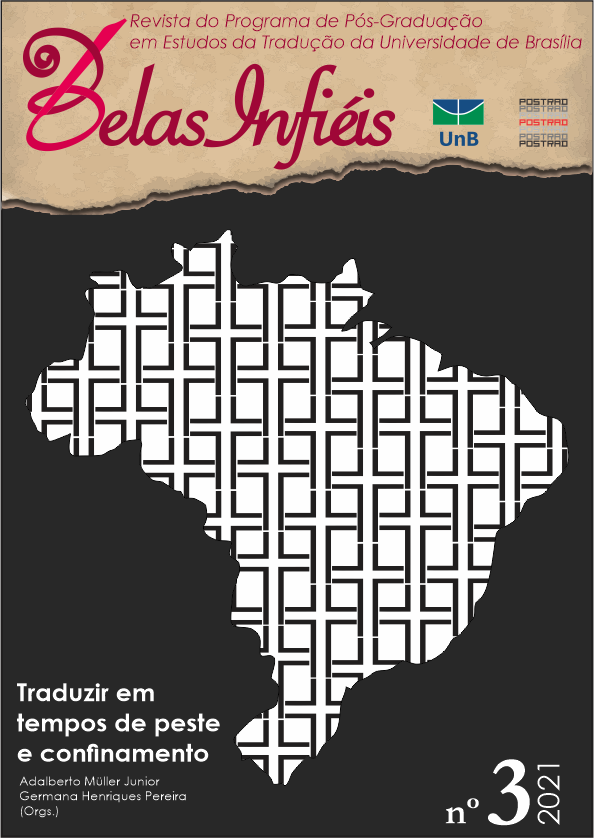Feminist translation and the power of removing voices from confinement
DOI:
https://doi.org/10.26512/belasinfieis.v10.n3.2021.33133Keywords:
Translation. Confinement. Feminisms. Women. Alfonsina Storni.Abstract
Among the many consequences caused by the covid-19 pandemic, an old problem has intensified due to confinement: the oppression that is perpetrated against women in a patriarchal system still in force. In this sense, feminist movements have, for many years, produced dialogues with different fields to remove this unjust system, which subjugates and confines women ”“ literally and symbolically. This work, therefore, seeks to present the contribution of translation in this sense, highlighting the perspective of feminist translation, which, for decades, has been offering theoretical and methodological tools to give voice to women confined to the context in which they wrote. Thus, with the objective of contributing to remove the work of women writers ignored by the publishing market, this work presents, in addition to a brief historical review of feminist theories of translation, data that show that many Latin American women are still not translated into Portuguese. As a way of contributing to the essential work of giving voice to these women, it is presented a summary of the life and work of one of the most powerful and affirmative Argentine writers of the early 20th century, Alfonsina Storni, who claimed, precisely, in her work, a fair and liberating space for women ”“ however, even so, almost a century after his death, Storni’s work remains practically unknown in Brazil. As an illustration of this effort, this paper presents a Portuguese translation of “Hombre pequeñito”, a poem by Storni that enunciates the voice of a woman who wants to leave the confinement to which she is subjected. It is understood, as a result of the proposed discussion, the need, still far from being met, to present countless other voices, through translation into Portuguese, for the Brazilian public, taking them out of the isolation of their starting context.
Downloads
References
Araújo, C. de G. S., Silva, L. de M., & Silva-Reis, D. (2019). Estudos da Tradução & mulheres negras à luz do feminismo. Revista Ártemis, (27)1, 2-13. https://periodicos.ufpb.br/index.php/artemis/issue/view/2337.
Berenstein, M. (2008). Alfonsina Storni: pequeña, grande, eterna. Capital Intelectual.
Castro, O. (2017). (Re)examinando horizontes nos estudos feministas de tradução: em direção a uma terceira onda? (B. R. G. Barboza, Trad.). Tradterm, 29, 216-250. https://doi.org/10.11606/issn.2317-9511.v29i0p216-250.
Castro, -O., & Spoturno, M. (2020). Hacia una traductología feminista transnacional. Mutatis Mutandis, (13)1, 2-10.
Chamberlain, L. (1988). Gender and Metaphorics of Translation. Signs, 13(3), 454-472. https://www.jstor.org/stable/3174168?origin=JSTOR-pdf&seq=1.
Derrida, J. (1979). Living on/borderlines (J. Hulbert, Trad.). In H. Bloom, P. de Man, G. Hartman, & J. H. Miller. (Eds.), Deconstruction and criticism (pp.75-176). Seabury Press.
Estadão Conteúdo (2020). Violência contra a mulher aumenta em meio à pandemia; denúncias ao 180 sobem 40%. https://www.istoedinheiro.com.br/violencia-contra-a-mulher-aumenta-em-meio-a-pandemia-denuncias-ao-180-sobem-40/.
Federici, E. (2011). The Visibility of the Woman Translator. In E. Federici (Ed.), Translating Gender (pp. 79-91). Peter Lang.
Godard, B. (1989). Theorizing Feminist Discourse/Translation. Tessera, 6, 42-53.
Guardia, S. B. (2007) Literatura e escritura feminina na América Latina. In Anais do XII Seminário Nacional e III Seminário Internacional Mulher e Literatura. UESC.
Mistral, G. (2019). Balada da estrela e outros poemas (L. Cunha, Trad.). Edições Olho de Vidro.
ONU Mulheres Brasil (2020). Violência contra as mulheres e meninas é pandemia invisível, afirma diretora executiva da ONU Mulheres. http://www.onumulheres.org.br/noticias/violencia-contra-as-mulheres-e-meninas-e-pandemia-invisivel-afirma-diretora-executiva-da-onu-mulheres/.
Revista Arcadia (2019). Cien años, cien libros de escritoras en español. http://especiales.revistaarcadia.com/los-cien-mejores-libros-recomendados-de-los-ultimos-cien-anos-escritos-por-mujeres/index.html.
Rocha, N. A. (2013). A constituição da subjetividade feminina em Alfonsina Storni: uma voz gritante na América. Unesp.
Simon, S. (2005). Gender in Translation. Routledge.
Storni, A. (1999). Obras/Poesía (T. I). Losada.
Venuti, L. (1996). The Translator's Invisibility: A History of Translation. Routledge.
Von Flotow, L. (1991). Feminist Translation: Contexts, Practices, Theories. TTR, (4)2, 69-84.
Von Flotow, L. (1997). Translation and Gender: Translating in the “Era of Feminism”. University of Ottawa Press, 1997.
Downloads
Published
How to Cite
Issue
Section
License
Copyright (c) 2021 CC BY

This work is licensed under a Creative Commons Attribution 4.0 International License.
Given the public access to this journal, the texts are free to use but requires the recognition of the original authorship and initial publication in this journal to be properly stated.
 The journal allows the use of works published for non-commercial purposes, including the right to submit the work to publicly accessible databases. Published contributions are the sole and exclusive responsibility of the author(s).Â



















